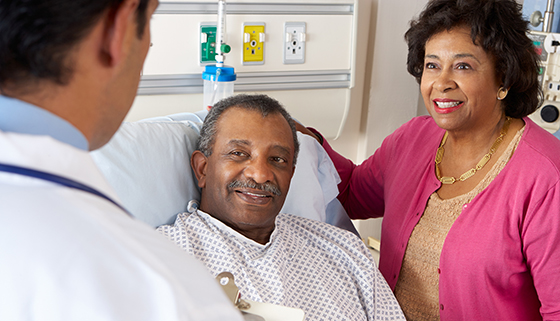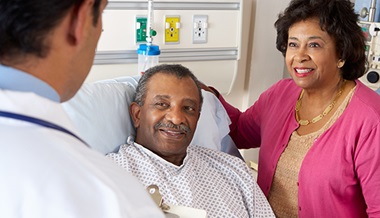Stomach Cancer Treatment
Reviewed By:
Stomach Cancer Surgery
Surgery is the most common part of stomach cancer treatment plans, and most patients will have surgery at some point.
There are several different surgical procedures called gastrectomies that involve removing a portion or all of the stomach where the cancer is present.
Your treatment plan may also include chemotherapy and radiation therapy in addition to surgery.
Lymph Node Removal During Stomach Cancer Surgery
Studies have found a link between surgical success and the total number of lymph nodes the surgeon is able to remove.
Removing as many lymph nodes as possible reduces the potential for the cancer to spread. It also provides a larger search area for pathologists to review to make sure the surgeons have removed as much cancer as possible.
Lymph Node Removal in Stomach Cancer Surgery: Johns Hopkins’ Advantages
When it comes to treating stomach cancer with surgery, lymph node removal is an important medical standard in the United States is the extraction of 15 lymph nodes. Johns Hopkins surgeons take out more than 15 lymph nodes for more accurate staging.
A skilled surgeon with lots of experience operating on stomach cancer is essential for safely and effectively performing the gastrectomy and removing the lymph nodes. Studies have shown that results are more favorable when both the surgeon and the hospital have a large gastrointestinal program, such as the one at Johns Hopkins, where physicians diagnose and treat many patients with varying types, stages and locations of stomach cancer.
Procedures Used to Treat Gastric Cancer
Your stomach cancer surgery will depend on the type of cancer, its location, its stage, the size of the tumor and whether the cancer has spread to other organs (metastasized). Here are some of the procedures the surgeon might recommend:
Endoscopic Mucosal Resection
This procedure can treat some very early stage small gastric cancers that have not spread beyond the stomach lining and show limited potential for spreading to the lymph nodes. This technique helps your doctor address a localized tumor and remove it, or destroy it with chemicals, heat, electricity or a laser.
Partial (Distal) Gastrectomy
For cancers in the lower (distal) portion of the stomach, your doctor may choose to remove the lower two-thirds of the stomach along with the nearby fatty tissue and lymph nodes. The surgeon then attaches the remaining part of the stomach to the intestine.
Total Gastrectomy
Cancers in the middle or upper stomach or those that have spread throughout the organ may call for removal of the entire stomach. When the stomach is taken out, the surgeon connects the esophagus directly to the small intestine. A reconstructive procedure called roux-en-Y creates a small pouch, which serves as a stomach, at the connection.
Stomach Cancer Radiation Therapy
Radiation therapy can help treat stomach cancer in several ways, and is often used along with chemotherapy, both before and after surgery.
Why Radiation Therapy Is Used to Treat Stomach Cancer
Radiation therapy can help treat stomach cancer and also can help relieve some of its symptoms.- Targeted radiation can shrink tumors and destroy cancer cells in nearby lymph nodes, reducing the likelihood that the cancer will spread.
- Radiation therapy (often together with chemotherapy) can shrink a tumor so that partial or full removal becomes possible.
- Radiation therapy after surgery can kill microscopic remnants of the cancer that are too small to be detected and removed in follow-up surgeries.
- As with chemotherapy and surgery, radiation can also be used for symptom relief (palliative care) by easing stomach pain, reducing or stopping internal bleeding and helping you regain your appetite.
Radiation Therapies Used to Treat Stomach Cancer
Radiation therapy can target tumors while leaving the surrounding tissue and other organs unharmed. The most commonly used therapy is called intensity-modulated radiation therapy.
Chemotherapy and Targeted Drug Therapy for Stomach Cancer
Chemotherapy (“chemo”) uses medications to destroy cancer cells. It may be recommended as part of your treatment for certain types of stomach cancer. Targeted drug therapy is a type of chemotherapy in which the medication works on specific proteins present in cancer cells or other aspects of tumors.
The multidisciplinary care team will put together a combination of treatments is best for each individual patient.
Chemotherapy is given in cycles. You undergo a period of treatment followed by a rest period to give your body time to recover. Each cycle typically lasts for a few weeks.
Types of Chemotherapy Used to Treat Stomach Cancer
Your chemotherapy treatment will depend on the type of stomach (gastric) cancer, its stage and your general health. You will take the medicine by mouth or by vein (intravenously). You might get one or more medications at different points during treatment.
- Neoadjuvant chemotherapy (chemotherapy before surgery): Studies have shown that patients with locally advanced stomach cancer have improved survival if they have chemotherapy before surgery, sometimes with radiation therapy. If you are receiving chemotherapy and radiation together, your care team will work with you to make sure you have nutritional support, since the treatment can cause nausea, and significant weight loss.
- Adjuvant chemotherapy (chemotherapy after surgery): If your stomach cancer is more advanced, your doctor may recommend chemotherapy after surgery as part of the overall treatment plan.
Chemotherapy may also be an appropriate treatment for those with advanced stomach cancer that cannot be treated with surgery.
Targeted Drug Therapy for Treating Stomach Cancer
Targeted drugs are designed to work on the unique genetic, biological and molecular structures of stomach cancer cells.
Trastuzumab is a drug that targets a certain protein called HER2, which is found to varying degrees in stomach cancer cells. When given with standard chemotherapy, trastuzumab can help some patients with advanced stomach cancer live longer than those treated with chemotherapy alone.
Other types of targeted drug therapies work by preventing the cancer from forming new blood vessels. This stunts the tumor’s growth and prevents it from spreading. These agents may be given alone or with chemotherapy to patients with advanced stomach cancer.
Immunotherapy for Stomach Cancer
Immunotherapy agents are a newer class of drugs that work to activate your body’s immune system to fight the cancer. Because immunotherapy works in a different way than traditional chemotherapy, it may be effective when chemotherapy does not work. Immunotherapy is often much better tolerated than chemotherapy.
One immunotherapy drug is pembrolizumab, which has been shown to be effective in certain types of advanced stomach cancer. Your doctor may conduct additional tests on the tumor to determine whether it is likely to respond to pembrolizumab.







